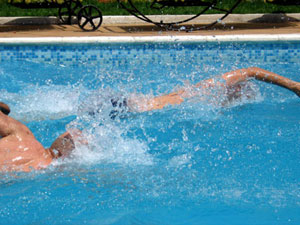A recently published study of 43 older men and women shows that swimming a few times a week lowered their systolic blood pressure. On average, systolic readings—the “top” number in a blood pressure reading—were 131 millimeters of mercury (mm Hg). Three months later, it was 122 mm Hg.
Normal blood pressure is defined as an average reading no higher than 120/80 mm Hg. Readings of 140/90 or higher are considered high blood pressure, and anything in between is considered “pre-hypertension.”
Swimming is often promoted as a good way for older adults to exercise. It also offers them the ability to work their body without harsh impact to their skeletal system.
When the body is submerged in water it automatically becomes lighter. Depending on how much of the body is submerged, the amount of weight the body bears can be reduced by as much as 90 percent.
There’s been little research into the health benefits of swimming —though a number of studies have suggested that it’s as safe for older adults as walking and bicycling, said Hirofumi Tanaka, a researcher at the University of Texas at Austin and also senior researcher on the new study.
The 43 study participants had a average age of 60 and had high blood pressure or pre-hypertension but were otherwise healthy. Published in the American Journal of Cardiology, the research appears to be the first to demonstrate that swimming can improve older adults’ blood vessel function and curb their blood pressure.
Tanaka said that swimming is easily accessible and inexpensive and also a very attractive form of exercise. After walking, swimming is the second-most popular form of exercise among the older set.
The researchers randomly assigned study participants to either have supervised swimming sessions or learn relaxation exercises. Over 12 weeks, the swimmers got in the pool three or four times a week, gradually working their way up to 45 minutes of swimming at a time. By the end of the study, the swimmers had shaved an average of nine points from their systolic blood pressure. In contrast, that number did not budge in the relaxation group.
The results of this study were not clear as to whether the blood pressure reduction lasts or whether it means the risk of heart attack or stroke is lowered.
However, the results match up with what experts recommend for older adults: get regular moderate exercise accompanied by a healthy diet.
